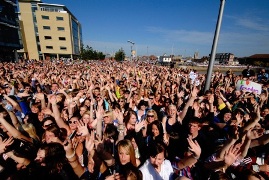Wilberforce and Freedom Festivals Assessments

The Moffat Centre was initially commissioned to evaluate the Wilberforce 2007 Bicentennial festival that took place throughout 2007 to celebrate the bicentenary of the ‘Abolition of the Slave Trade’ Act which was led by William Wilberforce who was born in Hull.
This year-long celebration of Wilberforce saw events take place in locations around Hull including seminars, lectures, music and arts, keynote speeches from the Archbishop of York and Cherie Booth and a music festival; ‘the Wilberforce Weekender’.
We evaluated a range of these events carrying out random street intercepts in Hull and East Riding and interviewing Weekender participants. In addition we undertook electronic surveys of petition signatories, Local Government Authority delegates, and members of the Hull and East Riding Chamber of Commerce. In addition self-completion surveys were distributed to gather the views of people visiting three exhibitions.
The evaluation sought not only to measure the economic impact of the events and their contribution to the local economy, but also to explore local perceptions and attitudes about Wilberforce and his legacy and about the strengths and weaknesses of Hull as a tourism destination.
In addition, the analysis was undertaken to raise awareness of slavery locally and nationally as an issue of major global concern. The project served as a catalyst to collect signatures and support for the anti-slavery petition.
The Wilberforce 2007 cluster of events was successful in many ways. It demonstrated that the city of Hull had the capacity and capability to operate a major festival. The year of events generated significant press coverage, some economic impacts.
Undoubtedly the events helped boost civic pride and began a step change in attitudes and perceptions of Hull as a place to live in and a destination.
The Moffat Centre recommended that Visit Hull and East Yorkshire (VHEY) and their funding partners should continue to utilise events to develop Hull as a destination and influence destination perceptions amongst locals and visitors.
The initial Wilberforce Weekender set the stage for the Freedom 2008 ‘prequel’ Festival which continued to develop the image of Hull as the ‘City of Freedom’.
In 2008, the Freedom Festival attracted around 30,000 visitors. Free activities included a street theatre, dance performances, live music featuring chart topping acts and a ‘silent disco’.
In 2009, the Freedom Festival was bigger and better than the 2008 pilot event attracting a crowd of some 150,000. The weekend of activity saw the city centre come to life in a number of key locations and acts such as Peter Andre and Pixie Lott featured amongst the headlining acts.
The Moffat Centre carried out socio-economic impact analyses of the Freedom Festivals in both 2008 and 2009. We carried out random intercept surveys of festival goers to generate data on expenditure, motivation and experiences. Capture of economic data was undertaken to calculate gross expenditure, additionality, displacement and net additional expenditure.
We triangulated this information alongside data from organisers, artists, sponsors and local businesses to extend the economic impact findings. An analysis of the value of press coverage and marketing was also undertaken. Analysis was carried out using software such as SPSS and Excel. A full report was produced soon after the weekend of each of the festivals.
Findings were presented on estimated visitor expenditure on food, drink, accommodation, leisure activities, transport and retail. In addition the Moffat Centre provided innovative analyses of the influence of social networking sites, the impact of the festival according to the observations of local businesses and the value of advertising and revenue generated through merchandising and catering.
